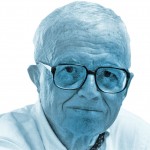Simchat Torah, a Jewish festival that pays its annual call this week, celebrates the completion of the yearlong reading of the Torah. Scrolls are removed from the ark and carried or danced around the synagogue seven times. As a descendant of German and Yankee Protestants, I had never heard of that joyful rite. But I’ll never forget the evening when it unexpectedly came into my life.
The story begins at Yale University in 1967, when a new Yale president, Kingman Brewster Jr., officially stating his mission, said, “We want Yale men to be leaders in their generation.” Unofficially, he said, “I do not intend to preside over a finishing school on Long Island Sound.” By which he meant a self-replenishing colony of white Protestant males who had mainly gone to private schools. He appointed a new dean of admissions, R. Inslee “Inky” Clark, who shared his vision of a student body selected on the basis of merit, reflecting every social and ethnic strain.
Clark’s first class, which entered Yale in 1966, had more graduates of public schools than any class in Yale history. It also had far more minorities, conspicuously including Jews and excluding—for the first time—a considerable number of alumni sons, who until then had been almost automatically admitted. By 1970 the Brewster-Clark revolution was complete, and those two names were spoken with rage and loathing by old-guard alumni. But Brewster had yanked Yale into the future, creating an admissions process that would funnel into its classrooms and labs—especially when women were admitted in 1969—a steady infusion of future leaders.
When I came to Yale in 1970 to teach writing I also arrived by a route that broke with tradition, I was–God forbid–a journalist, with a mere B.A. degree. I was quickly caught up in the energy of the campus, much of it generated by the formerly excluded outsiders. Most of my students who later became prominent writers and editors were Jewish.
In 1973 I became master of Branford College, one of Yale’s 12 residential undergraduate colleges. Attached to every college was a large corps of Fellows–professors and scholars from every discipline in the university, many of them giants in their field. Those ranks also included a category called Associate Fellows, mostly New Haven businessmen and civic leaders and alumni who had some connection with Yale. Quite a few were old-guard alumni still living in Yale’s homogenous past. I recall one white-haired man whose florid face suggested a lifetime of Saturday afternoons tailgating at Yale Bowl. He looked as if he didn’t have much use for the newfangled master.
One Thursday evening in October, early in my tenure, the Fellows were meeting in the Fellows’ Lounge, a room hung with Branford photographs and memorabilia, which adjoined a small Gothic chapel at the base of Harkness Tower where weddings and other religious services were held. On Friday evenings it was used by Yale’s Jewish community for its Sabbath observance. But on that particular Thursday night the Jews next door seemed to be celebrating a special holiday; through the connecting door I could hear shouts and whoops.
I had made a new friend in Rabbi Arnold Jacob Wolf, the recently appointed chaplain of Yale’s growing Jewish population. I liked him for his wisdom and his warmth, and he saw me as a fellow pastor to the young. What happened on that Thursday night, as I later pieced the events together, was that Rabbi Wolf, lacking a synagogue where he could sing and dance with the Torah scrolls, led his Simchat Torah flock around Branford’s courtyard. Then, instead of returning to the chapel by its front door, he decided to go through the lounge where Branford’s Fellows were holding their meeting.
I heard the door open and saw Arnie Wolf standing in a sea of noise and commotion. He gave me a nod of acknowledgment as the host, which I returned. Then he walked across the Fellows’ lounge to the door leading back into the chapel, trailed by a ragtag procession of revelers. Disheveled in merrymakers’ garb, tooting horns and shaking party noisemakers, they kept coming and coming; it was several minutes before the last celebrant of Simchat Torah marched through the Fellows’ meeting and disappeared through the chapel door.
I took Arnie Wolf’s visit as a gift of trust. He knew I would be pleased to be included in a ritual so important to the Jewish year and its cycle of worship, and I was. Some of the Fellows were less pleased; they looked as if a tropical squall had blown through the room. On the ruddy face of the old tailgater I caught a look of horror.
The next day, I was told, he and several other Fellows called president Brewster to protest the outrage. But I never heard anything from Brewster. I think he would have enjoyed the moment.


